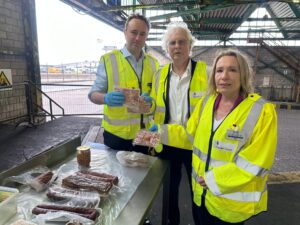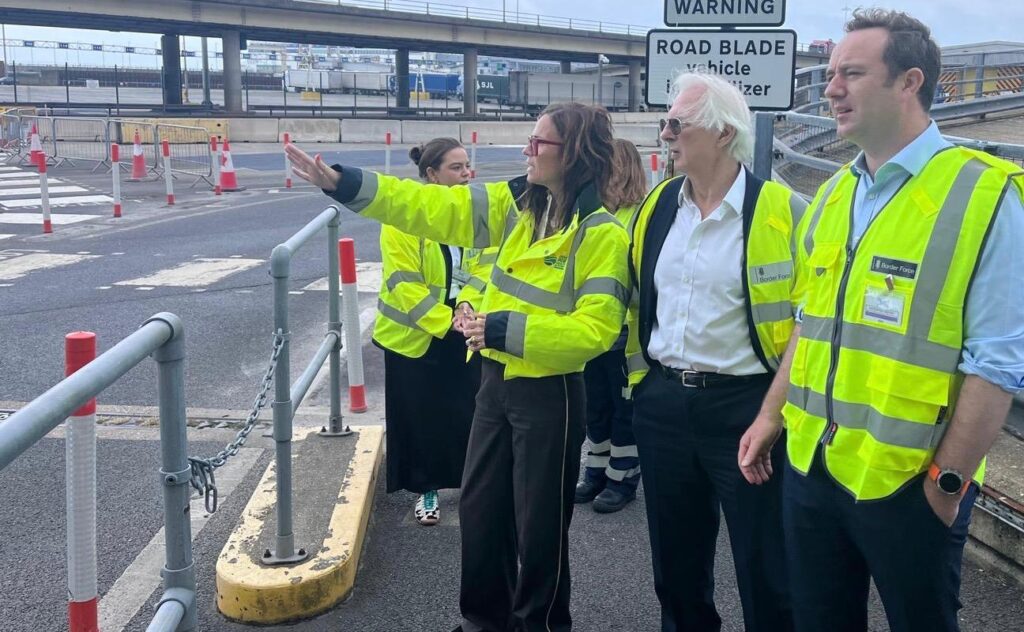Parliamentarians have witnessed at first-hand the efforts underway to uphold the UK’s biosecurity and protect the country from diseases like African Swine Fever (ASF) and Foot and Mouth Disease (FMD) at the Port of Dover.
In a visit organised by the NPA, members of the All-Party Parliamentary Group (APPG) on UK Food Security travelled to Dover and meet with officials from Border Force and Dover Port Health Authority (DPHA).
This visit followed an APPG meeting in December when DPHA came to Parliament to talk through the risk posed by the illegal import of banned products of animal origins (POAO), NPA senior policy adviser Tom Haynes explained.
“During both this earlier meeting and the visit last week, APPG members saw a range of examples where meat and POAO that had been brought into the UK illegally – not just through the personal import route, but also smuggled into commercial loads as well,” he said.
“Some of the commercial loads had this illegal POAO well hidden amongst legitimate consignments and were due to clear customs unchecked owing to flaws in the post Brexit commercial imports system, known as BTOM. Had DPHA not undertaken random spot checks on these vehicles, this illegal POAO would have entered the country.”
FRONT LINE

DPHA has now seized more than 243 tonnes of product since October 2022, despite limited funding and only a small percentage of vehicles being checked. It looks as though this year’s figure will, just over half way through 2025, very shortly overtake the total seizure for the whole of 2024, Mr Haynes added.
During the course of the visit, APPG members Helen Morgan and Danny Chambers, both Liberal Democrat MPs, and Crossbench peer Lord Trees, toured both the tourist and freight lanes with DPHA’s Lucy Manzano, witnessing the procedures the teams undertake as well getting hands on with some of the recently seized products.
POAO risk
Mr Haynes said the recently-agreed UK-EU deal, including an SPS agreement, was a welcome first step that will negate the need much of the flawed BTOM implementation. “However, it is unlikely to come into force for a number of years and does not reduce the risk posed by illegally imported POAO, especially from malign actors,” he said.
“As we transition to this new system, having robust biosecurity defences at the border must be a priority and we cannot simply rely on the EU to do this work for us. Much of the produce which is being seized at Dover, has already entered from outside the European Union and then travelled the whole way across the EU before landing at UK ports.”
Meanwhile, in Westminster, peers have been debating amendments to the Border Security, Asylum and Immigration Bill. The amendments, organised by the NFU and supported by the NPA, called for the government to have due consideration for illegal meat imports as part of its renewed efforts to secure the UK’s border.
Lord Rooker, who led the amendments, highlighted the Dover visit. “This is happening in real time: we are debating it, and they are doing it. A team of parliamentarians is currently in Dover looking at these serious issues. The noble Lord, Lord Trees, is not here because he is getting his hands dirty in Dover,” he said.
Mr Haynes said there was ‘still a long way to go on this journey, and threat posed by this illegal activity remains high’, but we welcomed the assurances given by the Home Office minister, Lord Hanson, who said: “It is absolutely right that biosecurity will be a key issue for the Border Security Commander. The threats posed to UK biosecurity by illegal meat imports are implicitly included within the definition of threats to border security in Clause 3.
“The commander will and does work closely with colleagues in Defra and Border Force through his board to ensure that the strategic priorities for border security are tackled.”




